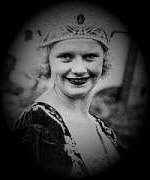 | In Prix de Beaute Louise plays Miss France in a pageant. Here is Marian Bergeron, Miss America 1933. |
|
Originally shot as a silent, this hybrid production had its soundtrack added prior to release in 1930, incorporating dubbed dialogue, sound effects, and a musical score. For the second time, Louise Brooks spoke on the screen, and for the second time the voice was not her own, but that of an uncredited French actress. Outside of France, Prix de Beaute was shown as Miss Europe.
James card has cited this performance for its naturalness, and has called it the one that most closely resembled the real-life Louise Brooks. And yet there was little rapport between actress and director Genina. She was upset with him for continually urging her to smile; he was disturbed by her drinking. As he wrote in his memoirs: "She would have been the ultimate actress if it weren't for alcohol." Indeed, it was a general subject of wonderment how well she photographed under the circumstances. Not a few critics commented about the power of the film's final sequence. And, of course, no one knew that it signaled the end of her starring career in major films. Remaining in Paris to relax after the completion of shooting that autumn of 1929, Louise was at the height of her youthful beauty as she turned 23. She returned to New York that December to learn that Pandora's Box had not been well received there. As she would later write her brother, Theo: "At the time these pictures were released as silents, everybody wanted to see talkies, so that my films went unnoticed and I decided I was a great failure." Prix de Beaute wasn't even picked up for U.S. release. |
Copyright: McKenna W. Rowe, 1997-2006